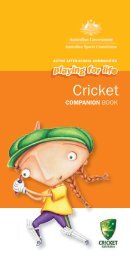Cricket
Create successful ePaper yourself
Turn your PDF publications into a flip-book with our unique Google optimized e-Paper software.
34<br />
UNIT 6<br />
History of <strong>Cricket</strong><br />
The origins of cricket are not clearly documented. However, it is clear<br />
that from earliest times people played games which involved striking<br />
an object with a stick. Some of the more interesting or key dates are<br />
listed below. Further details may be obtained by reference to texts<br />
included in Recommended Reading.<br />
Earliest Recordings<br />
Date Event or Record<br />
1300 Documented evidence that Prince Edward played a<br />
game called Creag.<br />
1344 A document in the Bodleian Library illustrates a<br />
cricket-like game being played.<br />
The Saxon word “cricce” or “cric” (a staff or crooked<br />
stick) may be the origin of the name.<br />
1500 and 1598 Records at Guildford mention “Creckett” and refer to<br />
playing “crecket and other plaies”.<br />
1611 Chichester Court – two men fined for playing cricket<br />
on Sunday.<br />
1624 The first recorded fatality, when Jasper Vinall died<br />
after having been accidentally struck with a cricket bat.<br />
17th century Some evidence that cricket may have been played in<br />
public schools.<br />
The Start of the Modern Game<br />
1744 The Laws of the game first written down and printed.<br />
1787 The formation of the Marylebone <strong>Cricket</strong> Club (MCC).<br />
1788 The MCC revised the laws.<br />
1864 The modern over arm style of bowling was made legal.<br />
The game was further developed following improvements to the<br />
grounds as a result of the use of the “heavy roller”. Additionally,<br />
between 1850-1855 mowing machines were first used.<br />
The latter half of the 19th century was the era of W. G. Grace who,<br />
during his career, made 54,896 runs and took 2,864 wickets. He<br />
retired in 1908.<br />
The History of County <strong>Cricket</strong><br />
1787 The first “county” club, Oxfordshire.<br />
1853 The first county champions, Nottinghamshire.<br />
NB: At this time the press decided who were the champions.<br />
1890 County Secretaries officially acknowledged the<br />
championships.<br />
Test <strong>Cricket</strong><br />
1736 Sailors recorded as playing cricket near Lisbon.<br />
1844 First international between USA and Canada.<br />
1859 First tour by England of USA and Canada.<br />
1861-62 First tour of Australia.<br />
1876-77 First test matches played.<br />
1878 Australians travel to England.<br />
1880 First test match played in England.<br />
1882 England beaten by Australia at the Oval. The Sporting<br />
Times reported “The body will be cremated and the<br />
ashes taken to Australia”.<br />
1882-83 England beat Australia in Melbourne. Some ladies<br />
burned a bail, sealed the ashes in an urn and gave it to<br />
the English Captain. On his death the ashes were left<br />
to the MCC, and this is the basis of the Ashes<br />
competition.<br />
1909 Imperial <strong>Cricket</strong> Conference established to administer<br />
cricket worldwide.<br />
1965 The name was changed to the International <strong>Cricket</strong><br />
Conference.<br />
1968 The Test and County <strong>Cricket</strong> Board was established to<br />
run test cricket, and the National <strong>Cricket</strong> Association to<br />
foster interest in coaching and the recreational game.<br />
The MCC administer the Laws both at home and abroad.<br />
All three of the above form the <strong>Cricket</strong> Council, the governing body of<br />
the sport. There are also the Minor Counties Association, the Irish<br />
<strong>Cricket</strong> Union, the Scottish <strong>Cricket</strong> Union and the Welsh <strong>Cricket</strong><br />
Association.<br />
1989 The International <strong>Cricket</strong> Conference renamed the<br />
International <strong>Cricket</strong> Council.<br />
1992 South Africa re-admited to international cricket.




